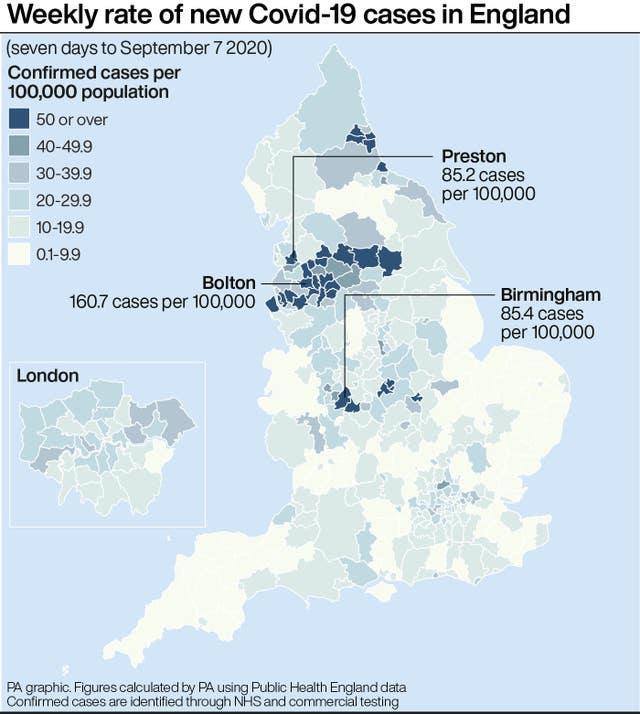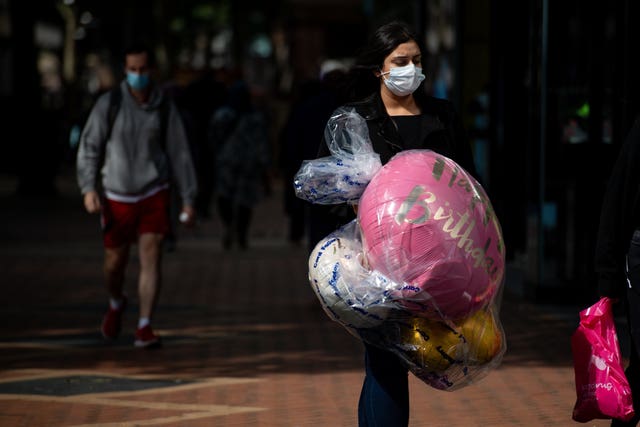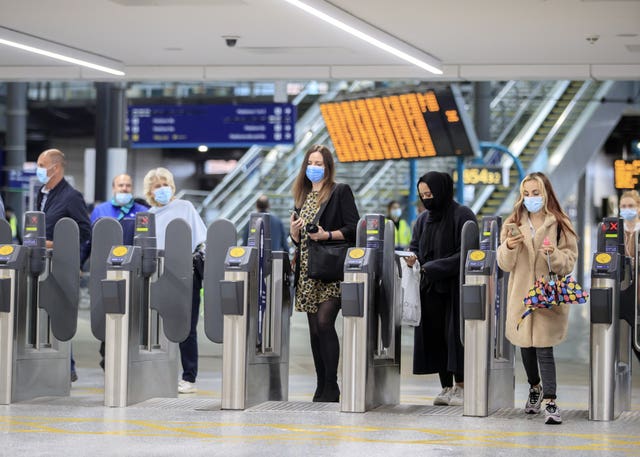Tough new Covid-19 restrictions are being imposed across Birmingham after infections rocketed.
People in the city of 1.14 million residents, alongside neighbouring Solihull and Sandwell boroughs, are to be banned from mixing with other households, following two days of discussions between Government and regional health and local authority leaders.
West Midlands mayor Andy Street, who had travelled to London to meet with officials, said earlier this week additional restrictions were “very, very likely”.
On Friday, Mr Street said he had been permitted to read out a statement headed “Ban on household mixing in Birmingham, Sandwell and Solihull”, with the agreement of Health Secretary Matt Hancock – who had been due to make the announcement.
The mayor said: “The following areas will now be escalated to an area of national intervention, with a ban on people socialising with people outside their own household.
New restrictions for #Birmingham in order to push down the coronavirus rates of infection.From Tuesday #Brum residents will not be able to mix with any other households, indoors or in private gardens, except for those in a support bubble: https://t.co/Y58CsikPkj #KeepBrumSafe pic.twitter.com/ObtgI5xhi3
— Bham City Council (@BhamCityCouncil) September 11, 2020
“The ban will take effect from Tuesday 15th September, but residents are advised to avoid household mixing before then as it has been identified as one of the drivers of transmission.”
He added the ban applies to the whole of Birmingham, Sandwell and Solihull.
Concluding his statement, Mr Street said: “This decision has been made in collaboration with local leaders who are considering additional local measures to tackle the increase in the number of cases.
“So to emphasise, this is about mixing between households, it is not about prevention of schools, workplaces, transport, any of the other options – it is about household mixing.”
Mr Street said the full Government announcement on measures, potentially affecting other areas of the country, will be made “later”.
Jess Phillips, the Labour MP for Birmingham Yardley, told ITV’s Peston on Wednesday that lockdown-style measures were looking increasingly inevitable.
The city’s director of public health Dr Justin Varney said the uptick in cases is “linked primarily to private household gatherings” at the end of August and across the bank holiday weekend.

An increase in testing had also turned up more positive results, he added.
Licensed premises, like pubs and bars, and restaurants flouting contact tracing rules and social distancing are also believed to be part of the problem behind rising rates.
The mayor also said younger people “had got to take responsibility”, with the biggest growth in cases in the under-40s age group.
According to NHS Digital data, the latest seven-day rate for the city to September 8 showed 78.2 cases per 100,000, with 892 infections over the period – among the highest in Birmingham since April’s peak.
For the previous seven-day period, the rate was just over 30.
The city had already been moved up the rungs of the national Public Health England (PHE) watchlist, which ranks local authority areas of concern by infection rate.
Birmingham was deemed an area in need of “enhanced support” last month, after recording a seven-day infection rate above 30 per 100,000 people.
Of particular concern to health chiefs is the fact the rate has been increasing day-on-day.

Birmingham City Council rapidly introduced tougher measures – agreed with the Government – including a legally-enforced crackdown on businesses flouting Covid-19 measures.
A whistleblowers’ hotline set up in August allowing people to report rule-breaking businesses has had more than 800 calls.
Two restaurants in the city were then sanctioned by council officials for hosting larger-than-allowed gatherings, in breach of Government guidelines.
An asylum centre in the Edgbaston area was also handed a direction order, forcing it to tighten Covid-19 control measures, after 56 staff and residents tested positive – the city’s largest outbreak to date.
The current positive infections tally puts Birmingham third in a national table of local authority areas with the highest infection rates, behind Bolton and Sunderland.
Bolton’s seven-day rate currently stands at 143 cases per 100,000, and Sunderland is on 84, according to data from NHS Digital.
Solihull’s latest infection rate for the week ending September 8 was 62.8.
Sandwell has grappled with stubbornly high infection rates for weeks.
Only last week, the head of England’s biggest NHS hospital trust said there was “absolutely no scientific evidence” that coronavirus is weakening, as he warned against complacency in Birmingham.

Dr David Rosser, of University Hospitals Birmingham NHS Trust, said rumours the virus has significantly “mutated” into a less virulent form are incorrect and medics are “deeply concerned” about an increase in hospital admissions.
Elsewhere, Leeds, which is in 13th place on the infection rates table with 60 cases per 100,000, could also face tougher measures.
A total of 474 new cases were recorded in the city over the week period.
Last Saturday, the city council’s Labour leader Judith Blake called for the authority to be granted greater powers to intervene in order to stem the spread of the virus.
Ms Blake said “personal contact” with local people would be more effective in convincing them to self-isolate than the centralised over-the-phone NHS Test and Trace system has been.
She said then: “We feel there is a bit of a complacency coming in.
“What we are seeing is the numbers are changing, and actually more young people are testing positive and they are spread around the city.”
Previous seven-day data showed other cities recording sharp increases in their weekly rate, including Salford, Manchester and Liverpool.




Comments: Our rules
We want our comments to be a lively and valuable part of our community - a place where readers can debate and engage with the most important local issues. The ability to comment on our stories is a privilege, not a right, however, and that privilege may be withdrawn if it is abused or misused.
Please report any comments that break our rules.
Read the rules here